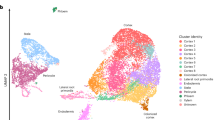Abstract
THE root nodule bacteria of leguminous plants (Rhizobium spp.) have repeatedly been observed to survive as long as 15–16 yr. in various media1,2. Bisset3 has explained this remarkable longevity as due to formation of endospores in a complicated life-cycle.
This is a preview of subscription content, access via your institution
Access options
Subscribe to this journal
Receive 51 print issues and online access
$199.00 per year
only $3.90 per issue
Buy this article
- Purchase on Springer Link
- Instant access to full article PDF
Prices may be subject to local taxes which are calculated during checkout
Similar content being viewed by others
References
Fred, E. B., Baldwin, I. L., and McCoy, E., Root Nodule Bacteria and Leguminous Plants (Univ. of Wisconsin Studies in Science, No. 5, 1932).
Allen, E. K., and Allen, O. N., Ruhland's Handb. d. Pflanzenphysiol., 8, 48 (1958).
Bisset, K. A., J. Gen. Microbiol., 7, 233 (1952).
Nutman, P. S., J. Bacteriol., 51, 411 (1946).
Author information
Authors and Affiliations
Rights and permissions
About this article
Cite this article
JENSEN, H. Survival of Rhizobium meliloti in Soil Culture. Nature 192, 682–683 (1961). https://doi.org/10.1038/192682a0
Issue Date:
DOI: https://doi.org/10.1038/192682a0
This article is cited by
-
Starvation and penetration of bacteria in soils and rocks
Experientia (1990)
-
Natural variation in symbiotic nitrogen-fixingRhizobium andFrankia spp.
Antonie van Leeuwenhoek (1984)
-
Establishment and survival ofSpirillum lipoferum
Proceedings / Indian Academy of Sciences (1977)
-
Longevity of Micro-Organisms
Nature (1962)
Comments
By submitting a comment you agree to abide by our Terms and Community Guidelines. If you find something abusive or that does not comply with our terms or guidelines please flag it as inappropriate.



